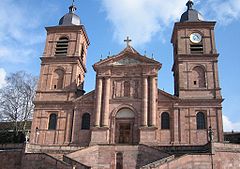Saint-Dié Abbey
|
Diocese of Saint-Dié Dioecesis Sancti Deodatiis Diocèse de Saint-Dié |
|
|---|---|

|
|
| Location | |
| Country | |
| Ecclesiastical province | Besançon |
| Metropolitan | Archdiocese of Besançon |
| Statistics | |
| Area | 5,903 km2 (2,279 sq mi) |
| Population - Total - Catholics |
(as of 2014) 379,724 315,170 (83%) |
| Information | |
| Denomination | Roman Catholic |
| Sui iuris church | Latin Church |
| Rite | Roman Rite |
| Established | 19 November 1777 |
| Cathedral | Saint-Dié Cathedral |
| Patron saint | Saint Deodat |
| Current leadership | |
| Pope | Francis |
| Bishop | Jean-Paul Mary Mathieu |
| Metropolitan Archbishop | Jean-Luc Bouilleret |
| Emeritus Bishops | Paul-Marie Joseph André Guillaume, Bishop Emeritus (1984-2005) |
| Website | |
| Website of the Diocese | |
The Roman Catholic Diocese of Saint-Dié (Latin: Dioecesis Sancti Deodatiis; French: Diocèse de Saint-Dié) is a diocese of the Latin Rite of the Roman Catholic Church in France. The diocese has the same boundaries as the department of the Vosges. The bishop has his throne at Saint-Dié Cathedral in the town now named Saint-Dié-des-Vosges, but since 1944 has lived in Epinal, capital of the département. The diocese is currently a suffragan of the Archdiocese of Besancon. The current bishop is Jean-Paul Marie Mathieu, who was appointed in December 2005.
The Diocese of Saint-Dié originated in the celebrated abbey of that name. Saint Deodatus (Dié) (b. towards the close of the sixth century; died 679) came, according his legendary written in 1050 by benedictin monks of Moyenmoutier, from Nevers and the Nivernais.
According to some historians, we do not known where Deodatus comes from : a hypothesis proposed from Ireland which explained the Latin reading confusion between Niverniensis and hiberniensis, others searchers think he could be a Christian who has travelled a lot, and may be lived in the North of Britain's Islands. He may be educated too in Austrasia by Scottish monks attracted by the reputation of Saint Columbanus.
Some sceptical scientists add this legend would definitely distinguish Déodat as a holy itinerant who was not a benedictin monk : he comes from nowhere. Maybe he was just a Christian chief. Only one fact is sure : Déodat is the founder and first patron of a Merovingian district with political and religious power, a ban decided by the king of Austrasia Childeric II. And, after his dead, he was considered and consacred by local populations as a holy man. As, for orthodoxic thinkers of these times, only monk could be perfect, Déodat was becoming gradually a monk.
...
Wikipedia
